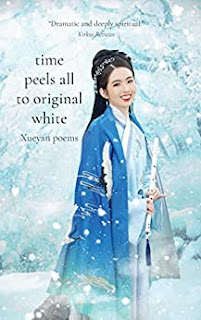Xueyan is the author of the new poetry collection Time Peels All to Original White. Her work has appeared in a variety of publications, including The Bangalore Review. She lives in China.
Q: Over how long a period did you write the poems in your new collection?
A: I completed writing my poems in less than a year. Then it took me almost two years to find a reputable publisher and to go through the publishing process; in the meantime, some of my poems were published in literary journals.
I write whenever the inspiration comes. For example, I can vividly recall that my poem “Holy Butterfly” was composed in three minutes; I was lying flat on my bed one night, when suddenly, a high feeling struck me and filled my heart with joy and excitement — I just knew I had to write something down; I opened the memo on my phone and the lines poured out from my heart so naturally, like wine fills a holy cup and it overflows:
Holy Butterfly
I ’light on Christ’s shoulder, flapping my wings
He carries me along the thorny path of blood and flame
When I become his heavenly wings
I gaze down at my dead body
The cross stands upright
Q: How was the book's title chosen, and what does it signify for you?
A: Time Peels All to Original White is the first line of the first poem in the collection; it was first inspired by mother’s hair: her hair grows whiter and whiter as the years go on and on relentlessly.
In addition, I think “white” has so much deep meaning, speaks to the very core of human existence. Time peels all to original white. No matter the colors of our hair, they all go white as life ebbs. No matter our differences in borders, cultures, races, and beliefs, the color of our bones is white. The simple truth of great nature reveals that every soul is born equal.
I don’t want to empower the book’s title with just my own philosophy; I would like that every reader participate in expanding the meaning of the book’s title. It’s like writer and readers building Lego together; my explanation serves as the original brick at the base, while readers’ different explanations become a kaleidoscope of diversely colored bricks, which gradually build up the interpretative edifice. The taller and more colorful the Lego, the more profound and expansive the meaning of the book’s title.
Q: The Kirkus Review of the book says, in part, “Xueyan reverently explores Mary and Christ as tragic figures, and the imagery can be stark and memorable. The poet seems to suggest that brutality is cyclic and inevitable; snow and water appear again and again to signal both beauty and death.” What do you think of that description?
A: I don’t think Mary and Christ are tragic figures. What is a tragic figure? In my opinion, a tragic figure is someone who lives out their whole life without ever examining the meaning of it. Mary and Christ know who they are, know what they are doing and know where they are going; I think they are everything that tragic figures are not.
Brutality is indeed cyclic and inevitable; however, love is also cyclic and inevitable. Brutality coexists with love like darkness coexists with light; without darkness contrasting the light, how can the light appear?
Beauty and death coexist in the snow, and also in the water. Snow is pure and beautiful, yet snow is also freezing cold and at a certain point can kill everything. Water can moisten and enliven every inch of land, but it can also flood and destroy anything in its path. Apart from snow and water, beauty and death coexist everywhere and in everything, across the universe. Fire is gorgeous and sometimes even magnificent — consider the stars — but it can also burn all to ashes.
Q: What do you hope readers take away from your poems?
A: I hope my poems can be stomach-soothing and soul-healing. I’d find pleasure if readers laugh a little while reading my poems; perhaps they can drink a cup of coffee or eat a piece of cheesecake at the same time. For my poems to be a peaceful or provocative accompaniment for some delicious food serves their mission well. If readers cry a bit, perhaps they can give someone they love a hug and feel the binding power of my poems.
Q: What are you working on now?
A: I am planning to publish my collection Time Peels All to Original White in Chinese and in China. I am translating the English into Chinese in my own way. In addition, I am also composing new poems for my second collection.
Q: Anything else we should know?
A: The word “Poetry” in traditional Chinese is written “詩”: the meaning of the left side “言” is “language”; the meaning of the right side “寺” is temple. So the literal meaning of “詩” is “the language of God.” I seek “Epiphany” as the key element of my poetry. It should strike like the language of God. A lightning sword of the highest purity crystal.
Readers can find some of my poems on my website www.xueyanpoetry.com; if they enjoy my poems, they are most welcome to leave me a message. Their encouragement will be sparkling stars for my writing momentum.
--Interview with Deborah Kalb


No comments:
Post a Comment